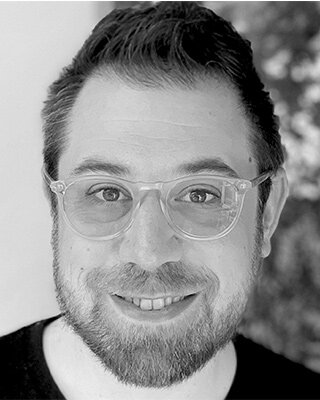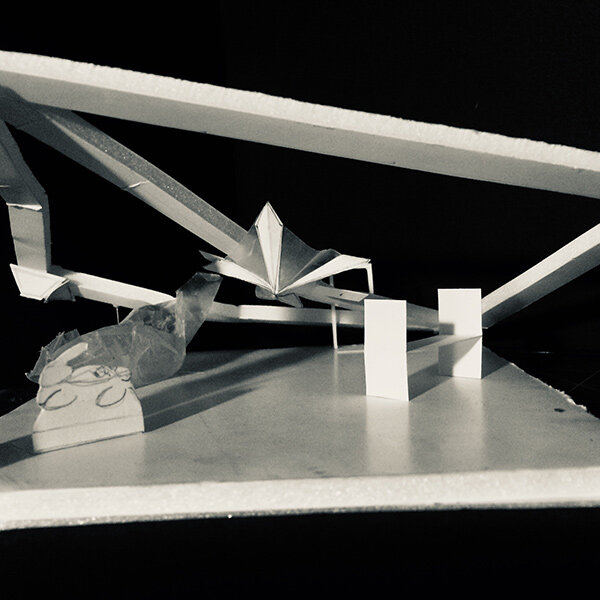Model by: Jason Simms
A small, pink motel room with two, blue, double beds, sits diagonally on an enormous stage. A cutout, black silhouette of a man stands atop one wall. Pieces of other room rain down all around.
The Fold
by Ken Rus Schmoll
(lights up, mid sentence)
2
—loved me and I loved you, every morning waking up, having coffee, every evening falling asleep, it was like I had finally stopped scanning the horizon, looking to the horizon, to the future, or trying to peer into it, trying to read the tea leaves, I had finally fallen straight down into the present, I was right there, for the first time it was like I fit inside myself, my skin, my skin and myself had the same, what, boundaries, boom, and I had no doubt that the person in my—no doubt that the person in my arms, the person whose arms I was in, who I was looking at over coffee, loved me, or not even loved me, it wasn’t that you loved me or I loved you, it was that you and I, we were, we were in a loving, a love-ing, a love-exchanging relationship, that’s how strong it felt, my full to bursting heart, the valves in my heart that, that regulate love, perpetually open, perpetually flowing, overflowing, can love leach into the surrounding organs if there’s too much of it, cause problems or failure, valve insufficiency? Apparently so. The answer, it turns out, is yes. This whole time, sitting with you, drinking coffee with you, reading the paper with you, in bed, lingering, on the way to wherever, the bank, with you, our hearts filling and refilling with our love for one another was an—
(1 and 2 have been sitting for hours, each on a bed, roughly knees to knees)
—illusion. I guess love had leached into my eyes, I didn’t notice that you weren’t actually there, that you had replaced yourself with, with a carboard cutout, of yourself, trompe l’oeil, and behind it, behind the cutout you were, what, checking your phone and wolfing down a sandwich.” And so I said to him, I think you’re being totally dramatic, or like totally—I don’t think you can expect love to be a perpetual motion machine, I mean how would anyone, how could anyone sustain—it’s unrealistic and, frankly, burdensome and unattractive and it’s—
1
You said that?
2
—plain false, yes, I did, it’s an emotion, and like all emotions, you feel and then don’t feel, alternately, and he says, “Love is not an emotion, it’s a state, a state of being,” and I—
1
What?
2
—just, I didn’t—I mean, no, I mean I get that, he’s describing a system or a correlation or a stasis, love as an equilibrium, it’s an equilibrium, it is equilibrium, love, I get that, but isn’t that still—isn’t there room for fluctuation? Can’t love, what is it, crest and trough without disappearing entirely, evaporating entirely? Isn’t love work? Isn’t that what people say? People have ups and downs! People are people! An illusion? Really? Aren’t you, um, manufacturing this illusion? Aren’t you manufacturing this truth? For yourself? I mean we all do, you’re human, you manufacture truth, we all do, every day, it’s a coping mechanism, it’s a currency, that we mint, that we each mint, and we— so—but anyway—but so how can you definitively say or state or…how can you make a case for…
(listening)
2
Are you hearing that?
(listening)
2
How can you decide, I mean aren’t you deciding the rules of the game mid game? You met her at church. At freakin church. It’s unfair. And he looks at me, like I’ve, I don’t know, like he’s accusing me…
(listening)
2
What’s that sound?
1
It’s
(listening)
2
my god
(listening)
1
not a sound you’re hearing
(1 and 2 are rising from the beds, moving very slowly, sensing beyond the walls)
2
(gasps)
1
No.
(listening)
2
. . . now?
(listening farther)
(1 would again reply no, but is stock-still, breathing suspended imperceptibly. 2 is weeping suddenly in spasms lengthily, which subsides only when)
(1 and 2 become like x-rays, are resolute, their thoughts a dragging crawl to the final) (lights out)
Audio Recording
1: Michael Sazonov Vitaly
2: Melody J. Munitz
Directed by Jennifer Delac
Ken Rus Schmoll
Ken Rus Schmoll is a sometime writer and an award-winning theater director.
Jason Simms
Jason Simms (he/him) is an award-winning scenographer for Theater, Opera, Musicals and Film and has designed over 200 productions as well as several film projects including music videos and short films. Born and raised in Carson City, NV, Simms started designing for theatre at the age of fifteen. He now resides in Ithaca, NY where he is an Assistant Professor of Design at Cornell University in the department of Performing & Media Arts. He designs sets in New York City as well as at regional theaters across the United States. Learn more about Jason at www.jasonsimmsdesign.com or see the virtual theatre he designed in response to the pandemic at www.thebubble.online.









